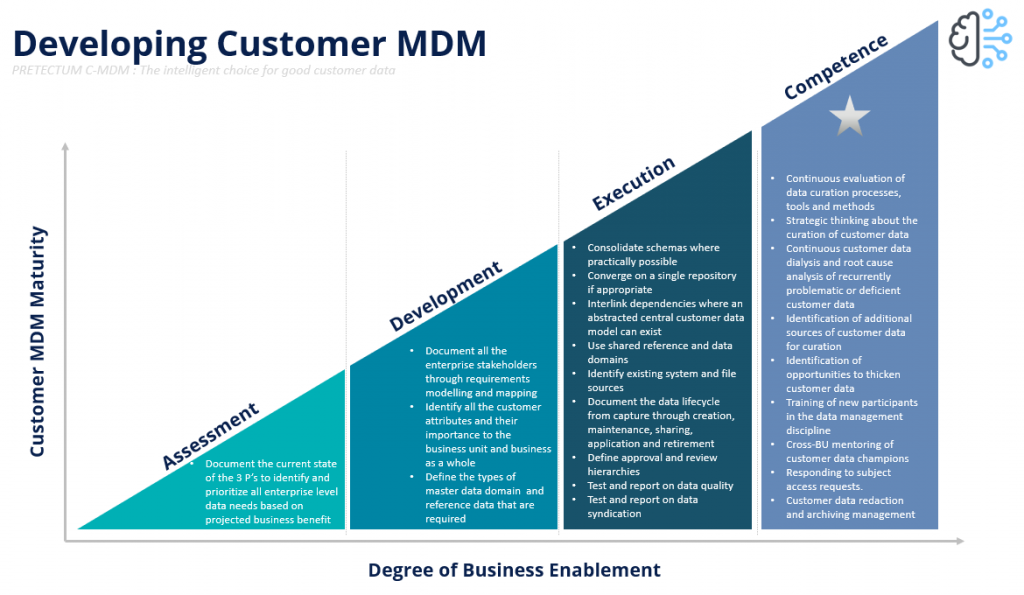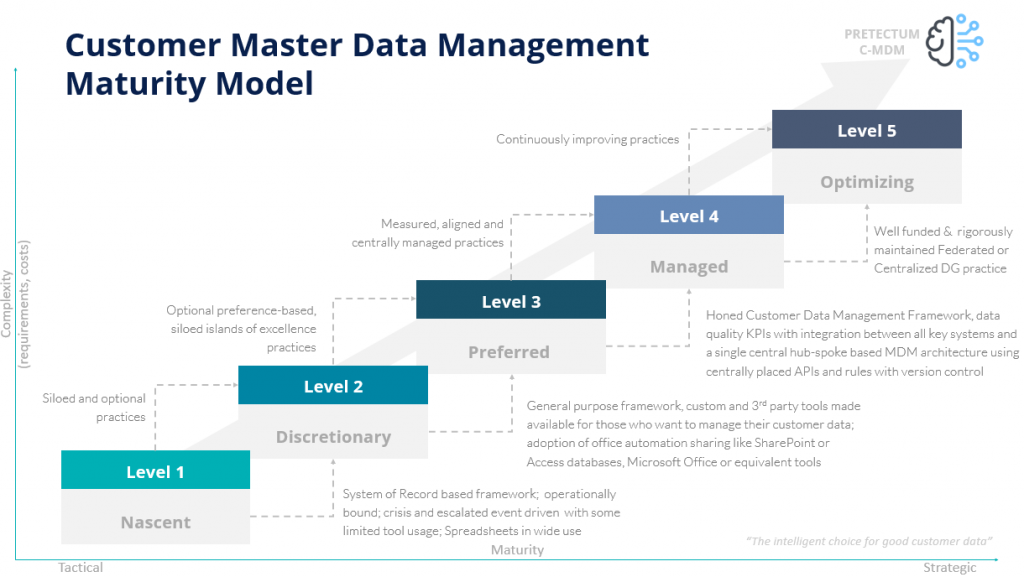Elevating Organizations to Level 6 and Beyond with Pretectum CMDM
Organizations today, are increasingly recognizing the importance of effective customer data management; they are striving to achieve higher levels of data maturity as they face the challenge of transitioning from basic data utilization to advanced strategies that leverage first-party and zero-party data.
Pretectum’s Customer Master Data Management (CMDM) platform offers a robust solution that not only facilitates this transition but also distinguishes itself from generic Customer Data Platforms (CDPs) and traditional data management platforms (DMPs).
Understanding Customer Master Data Management
Customer Master Data Management (CMDM) is a comprehensive approach that centralizes and manages customer data across an organization. Unlike generic data management platforms, CMDM focuses specifically on creating a unified view of the customer, which is essential for personalized marketing, improved customer service, and enhanced decision-making. Pretectum CMDM consolidates your data from your various sources, including CRM systems, ERP platforms, and other repositories, thereby providing a Single Customer View (SCV) that eliminates data silos and ensures consistency in customer interactions and can serve as your Single Source of Truth (SSOT).

The Role of First-Party and Zero-Party Data
To elevate organizations to Level 6 and beyond in their data maturity journey, it is crucial to understand the roles of first-party and zero-party data:
- First-party data is information collected directly from customers through their interactions with the brand. This may include purchase history (or summaries), website behavior, and engagement metrics. It is valuable because it reflects actual customer behavior and preferences.
- Zero-party data, on the other hand, is information that customers voluntarily share with a brand. This can include preferences, feedback, and intentions expressed through surveys or quizzes. Because this data is provided directly by the customer, it tends to be highly accurate and relevant.
By leveraging both types of data, organizations can create more personalized experiences that resonate with customers. Pretectum CMDM facilitates this by integrating first-party and zero-party data into a centralized repository, allowing businesses to understand their customers deeply. Wherever that data comes from, you can consolidate and create your own party!

Customer Self-Service Data Servicing
One of the standout features of Pretectum CMDM is its ability to enable customer self-service data servicing. This functionality empowers customers to manage their own data preferences actively. By providing a user-friendly interface where customers can update their information, consent preferences, and communication settings, organizations can foster trust and transparency.
This self-service capability not only enhances customer satisfaction but also ensures greater compliance with privacy regulations. Customers are more likely to engage with brands that respect their preferences and provide them with control over their personal information. As a result, businesses can build stronger relationships with their customers while minimizing risks associated with non-compliance.
Consent Management: A Pillar of Data Governance
In an era where data privacy concerns are paramount, effective consent management is critical. Pretectum CMDM incorporates robust consent management features that allow organizations to collect, store, and manage customer consent seamlessly. This ensures that all customer interactions are compliant with applicable regulations.
The consent management capabilities enable organizations to:
- Track consent states across multiple channels as you harvest it.
- Provide marketing teams with supplementary customer preferences, if you have them.
- Provide clear options for customers to withdraw consent at any time.
By integrating consent management into the CMDM framework, Pretectum not only enhances compliance but also strengthens customer trust—an essential component for long-term loyalty.
Real-Time Insights for Informed Decision-Making
Pretectum CMDM excels in delivering high performance real-time access to customer profiles in a secure way. This capability allows organizations to make quick, informed decisions based on up-to-date information about customer behavior and preferences. For instance, if a customer frequently browses specific products but does not complete a purchase, the business can algorithmically respond promptly with some next best action or personalized recommendations based on the customer data profile.
Agility in decision-making is a key differentiator for a business looking to stay competitive in today’s highly competitive environment. Leveraging real-time insights derived from first-party and zero-party data, means organizations can adapt various strategies to swiftly meet changing customer needs and preferences.

Distinction from Customer Data Platforms
While Customer Data Platforms (CDPs) focus on aggregating customer data from various sources for analytics purposes, Pretectum CMDM goes further by emphasizing master data management principles. CMDM not only consolidates and de-duplicates data but also enforces quality standards, governance policies, and compliance measures that are essential for maintaining high-quality customer records.
Pretectum CMDM’s ability to establish Golden Nominal Records, serves as an authoritative source of truth for all customer profiles. These records encompass all relevant information about the customer—ensuring accuracy and completeness—which is often lacking in generic CDPs.
Scalability and Flexibility
Pretectum CMDM’s composable architecture allows organizations to scale their operations vertically and horizontally as their needs evolve. This flexibility is particularly beneficial for mid-sized businesses aiming to enhance their data maturity without incurring excessive costs associated with rigid systems.
The modular design enables businesses to configure solutions tailored to specific requirements while ensuring seamless integration with existing systems. As companies grow or pivot their strategies based on market dynamics, Pretectum CMDM adapts accordingly—supporting sustained growth.

The Pathway to Advanced Data Maturity
As your organization strives to elevate its data maturity levels beyond Level 6, consider embracing Pretectum CMDM. By effectively managing first-party and zero-party data alongside robust consent management capabilities under a comprehensive master data management framework, your business could create a unified view of its customers.
A holistic approach not only enhances personalization but also fosters trust through transparency in data handling practices. Ultimately, Pretectum CMDM empowers organizations to navigate the complexities of modern data management while driving better business outcomes through informed decision-making and improved customer relationships.
Consumer expectations are high, leveraging the power of effective Customer Master Data Management will be key for those looking to thrive in competitive markets while maintaining compliance in an increasingly regulated environment.
Contact us to learn more

